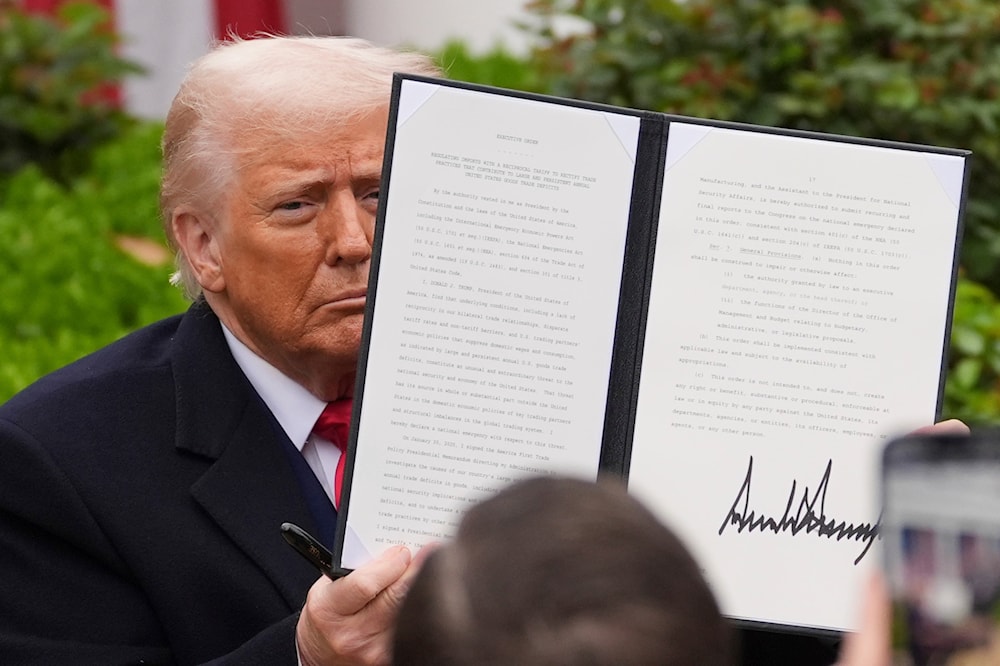Trump tariffs spark trade war, China and EU retaliate
Trump's announcement of wide-scale retaliatory tariffs prompted China and the EU to threaten the US with their retaliations, exacerbating the global trade war and shaking up the global economic system.
-

US President Donald Trump holds a signed executive order during an event to announce new tariffs in the Rose Garden of the White House, Wednesday, April 2, 2025, in Washington. (AP)
US President Donald Trump has fanned the flames of the global trade war by imposing a base 10% tariff on all US imports and reciprocal tariffs on Wednesday, which he dubbed "Liberation Day".
LIBERATION DAY RECIPROCAL TARIFFS 🇺🇸 pic.twitter.com/ODckbUWKvO
— The White House (@WhiteHouse) April 2, 2025
The White House unveiled sweeping new tariffs, sparking immediate upheaval in global markets as leaders around the world denounced the measures and vowed to retaliate against the levies.
The base 10% tariff goes into effect on April 5, and the higher reciprocal levies on April 9.
Facing newly imposed 54% tariffs on exports to the US, China pledged to retaliate with countermeasures, while the European Union also threatened to respond, as both allies and rivals of Washington united in condemning the move, fearing it could deliver a crippling shock to global trade.
"The consequences will be dire for millions of people around the globe," EU Chief Ursula von der Leyen said in a statement, adding that the European Union is planning on retaliating to the levies imposed by Trump should talks with the US falter. The European Union was hit with a 20% reciprocal tariff.
China urged the United States to immediately halt the reciprocal tariffs, and vowed to implement countermeasures to protect its own interests, with the Chinese minister of commerce saying that the US decision ignores the carefully negotiated balance of interests established through years of multilateral trade agreements, as well as the substantial benefits the country itself has consistently gained from global commerce.
Trump proceeded to sign an executive order targeting the "de minimis" trade provision that had allowed duty-free shipments of low-value items (priced at $800 or less) from China, with the White House announcing that this measure – which applies to goods originating from both China and Hong Kong – would become effective starting May 2.
Consequences and benefits
Trump framed the "reciprocal" tariffs as a direct counter to existing duties and non-tariff barriers imposed on American exports while maintaining that these new trade penalties would drive the resurgence of domestic manufacturing employment.
"For decades, our country has been looted, pillaged, raped and plundered by nations near and far," Trump stated
Independent economic analysts have cautioned that the imposition of tariffs may hinder worldwide economic growth, elevate recession probabilities, and potentially add thousands of dollars in annual expenses for typical US households.
Stephen Miran, who serves as both Trump’s top economist and chairman of the Council of Economic Advisors, conceded that the tariffs would undoubtedly create short-term economic disruptions. stating, "Are there going to be short-term bumps as a result? Absolutely," while simultaneously arguing that these trade measures would ultimately strengthen the US economy over the long term.
"This is how you sabotage the world’s economic engine while claiming to supercharge it," said Nigel Green, CEO of deVere financial advisory group, adding, "The reality is stark: these tariffs will push prices higher on thousands of everyday goods - from phones to food - and that will fuel inflation at a time when it is already uncomfortably persistent."
Markets witness shakeup
Trump's tariffs sent waves across global markets as traders waited anxiously for the White House announcement.
The US dollar saw a 1% drop against the Euro on April 2, with similar drops against other important currencies like the British Pound Sterling and the Swiss Franc.
US stocks declined in after-hours trading following President Donald Trump's announcement of broad new tariffs set at a minimum of 10%, with even steeper rates imposed on certain countries.
The SPDR S&P 500 ETF Trust (SPY), mirroring the S&P 500, dropped roughly 2%, while the Invesco QQQ ETF, tied to the Nasdaq-100 Index, fell 3.3%. The SPDR Dow Jones Industrial Average ETF Trust (DIA) also slid 1%.
Major importers saw sharp losses in Wednesday evening trading, with Nike plunging 6% and General Motors dropping 3%. Stocks already battered by tariff concerns over the past month extended their declines, including Nvidia and Tesla, each down approximately 3%.
Gold futures surged $20.20, or 0.6%, to settle at $3,166.20 per ounce on Wednesday as investors sought safe-haven assets ahead of President Donald Trump's anticipated tariff announcement, while spot gold hovered near $3,127 by the US market close.

 4 Min Read
4 Min Read








